Teachers Need to Be Educated About Students' Mental Health
ZAGREB, 7 June 2022 - Nearly three-quarters of school staff do not know how to recognize problems related to students' mental health or how to help them even though they would like to do so, hence they need to be educated, it was said on Tuesday ahead of this year's UNICEF Milky Way charity race.
This year, UNICEF will support the Milky Way race with a standardized mental health literacy program for teachers called "Help Me", implemented by the Croatian Institute of Public Health with the support of the Agency for Education.
The head of the Living Healthy program, Sanja Musić Milanović, said that in 2017, a survey was conducted on the health literacy of educators.
"The results showed that almost all of them or as many as 95% are willing to learn how to recognise and react to mental health problems of their students. However, 76% do not dare do anything because they do not know how they can help," she said.
That is why we need "education for educators," Musić Milanović said and invited citizens to join and support the education program. She added that physical activity is extremely important for maintaining mental health but also for the prevention of obesity and other health problems associated with being overweight.
The Milky Way race has attracted about 20,000 participants and raised about HRK 2.5 million. This year's edition is especially important because it comes after a challenging and stressful period marked by the pandemic and earthquakes, said the head of the UNICEF Office for Croatia, Regina Castillo.
Mental health means a better quality of life, and the first signs of mental health problems appear as early as childhood and puberty. Problems are present in 12% of young people between the ages of 10 and 19, Castillo said.
"Research conducted in Croatia indicates that the mental health of young people after the pandemic is deteriorating. "The idea behind the 'Help Me' program is to help people between the ages of 14 and 16 because that's when they feel powerless," the director of the Education Agency, Dubravka Brezak Stamać, said.
UNICEF's Milky Way charity race will take place from 9 to 18 September throughout Croatia. Citizens can participate by walking, running, cycling, rollerblading or by making a donation and in that way help raise awareness of the importance of the mental health of children and young people.
For more, check out our lifestyle section.
UNICEF Croatia Raises €400,000 in Donations for Children in Ukraine
ZAGREB, 25 March (2022) - UNICEF's Croatia Office has raised over HRK 3 million (€400,000) in donations for children in war-torn Ukraine, as well as for children in neighbouring countries and Croatia, the organisation said on Friday.
UNICEF Croatia said it has made itself available to the Croatian Civil Protection Directorate to work together with other institutions and organisations in providing support to children and families from Ukraine.
It said it was ready to provide psychosocial and other forms of support to children separated from their parents and help in strengthening the competencies of schools in Croatia that have accepted Ukrainian pupils.
Strengthening socioemotional competencies has proved very successful in Sisak-Moslavina County following an earthquake in late 2020, UNICEF Croatia said, adding that it has expertise in crisis situations and has dispatched its own experts to Poland and Romania to help with the biggest migrant crisis in recent history.
Since the start of the Russian invasion of Ukraine a month ago, over 1.5 million children have left Ukraine and most of them, together with their families, have found refuge in Poland, Hungary, Slovakia, Moldova and Romania.
Ukrainian children arriving in neighbouring countries are facing great risks, such as separation from their families, violence, sexual exploitation and human trafficking, UNICEF warned.
By 17 March, UNICEF had delivered 85 trucks with 858 tonnes of relief supplies for children and their families in Ukraine and neighbouring countries.
For more news about Croatia, click here.
UNICEF Continues to Care for Disabled Children in Quake-Hit Area
21 February, 2022 - Representatives of UNICEF and the Sisak-Moslavina County association of persons with disabilities presented the results of a support programme for disabled children in Petrinja on Monday.
The earthquakes that struck the region in late December 2020 damaged the premises used by the association and called into question the provision of the necessary support for children and counselling for their families.
Thanks to HRK 367,368 (nearly €50,000) in aid, about 100 children with disabilities will be able to continue using therapy services at the Little House, and the six professionals working with the children and their families will stay in their jobs.
The head of UNICEF Croatia, Regina M. Castillo, said that their focus was always on the most vulnerable children and that they would continue providing support.
UNICEF's ambassador in Croatia, Bojana Gregorić Vejzović, said that the value of what UNICEF was doing could particularly be seen in crisis situations when the most vulnerable children could be left out of focus. "We must not let them be forgotten."
Last year, the Little House organised 2,459 work therapy appointments, 1,336 sensory integration appointments, 798 physiotherapy appointments, 4,562 individual consultations with parents and guardians, and other services.
UNICEF Helps Equip Inclusive Classroom at Zagreb Teacher Education Faculty
ZAGREB, 29 Nov 2021 - A newly-equipped inclusive classroom, where students will acquire modern inclusive methods for work with pre-school children, was presented at the Zagreb Teacher Education Faculty on Monday. The equipment is a donation by UNICEF and the Kaufland retailer.
A total of 1,500 teachers will be trained annually in inclusive classrooms for work with children with developmental delays, behavioral problems, and Roma children, UNICEF said.
"All futures need opportunities. In order for all children, especially the most vulnerable, to progress and one day become equal members of society, we must work together to provide them with opportunities for education. Only well-educated professionals can ensure that every child receives the necessary support for development and learning, in a supportive environment. This is an investment that has long-term significance for all future generations. We are glad that our long-term partner, Kaufland Croatia, has recognized this, and I would like to take this opportunity to thank them for helping to improve the education of those who care about the future of our children'', said Regina M. Castillo, Head of UNICEF Croatia.
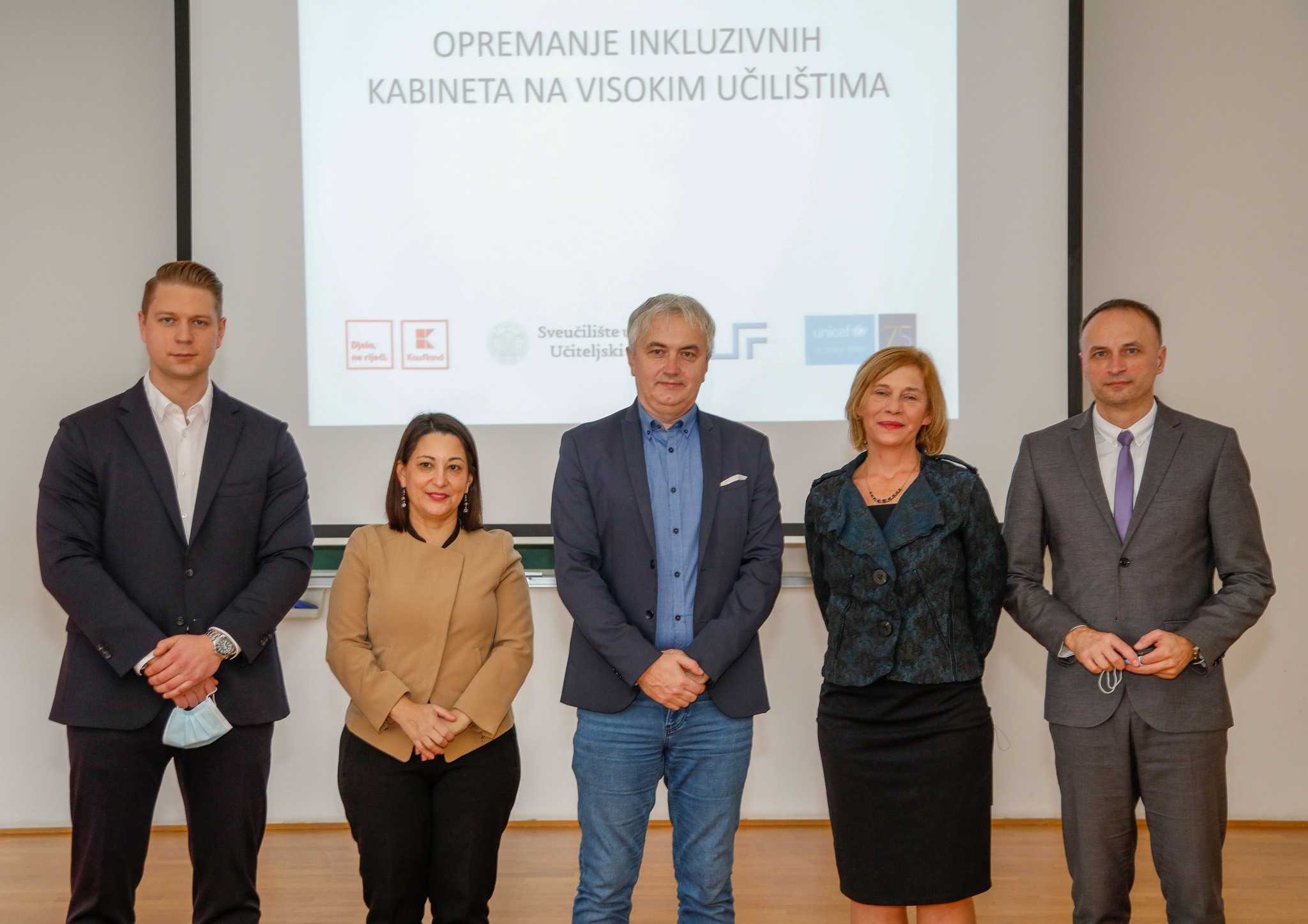
(From left to right) Patrick Rudat, President of the Management Board of Kaufland Croatia, Regina M. Castillo, Head of UNICEF in Croatia, Siniša Opić, Dean of the Faculty of Teacher Education in Zagreb, Dejana Bouillet, Professor at the Department of Pedagogy, and Tomisljav Paljak, State Secretary at the Ministry of Science and Education. (Photo: Miljenko Hegedić/UNICEF)
Owing to a donation of HRK 350,000 by Kaufland, UNICEF has equipped five inclusive classrooms at colleges in Zagreb, Split, Osijek, Pula, and Rijeka.
UNICEF is conducting the project for the promotion of initial teacher education for inclusive education in cooperation with the Zagreb Teacher Education Faculty and four other colleges.
Inclusive classrooms are equipped with teaching equipment and aids, basic equipment for sensory integration, as well as software for technology for assisted communication that helps future teachers in practical work and in learning innovative methods for working with children and inclusive education.
For more on lifestyle, follow TCN's dedicated page.
UNICEF Raises HRK 1.1 m For Children With Disabilities in Milky Way Race
ZAGREB, 14 Sept, 2021 - The fifth edition of the UNICEF humanitarian race Milky Way, held in a virtual setting this year again, has ended and a total of HRK 1.1 million has been raised over three months for children with disabilities through registration fees and donations from citizens and companies, UNICEF said on Tuesday.
More than 6,200 runners of all ages took part in the humanitarian virtual race. With the funds raised, UNICEF will support the establishment and expansion of professional services for children with disabilities in least developed areas, in which the availability of services is at its lowest.
Among the participants of the Milky Way Race were also 815 children, who took part with their parents or the 27 registered schools and kindergartens from all over Croatia. Participants used an application to connect to over 550 teams, and as many as 26 associations working with people with disabilities actively took part in the run. The race took place from 3 to 12 September.
In Croatia, children's chances for a quality life depend on the place where they were born and being a child in a larger city or a smaller place is often not the same. The main reason for our race it to change that and provide all children with the same opportunities for development, regardless of where they live, said the head of the UNICEF office in Croatia, Regina M. Castillo, thanking everyone who has shown they support children with disabilities in Croatia.
For more about made in Croatia, follow TCN's dedicated page.
UNICEF: Children Under 13 in Croatia Have Profiles on Social Networks
ZAGREB, 7 Sept, 2021 - Two-thirds of young people surveyed in Croatia (61%) opened a profile on social networks before they turned 13, a UNICEF survey shows, warning that young people leave their mobile phone numbers and photographs online without any control.
Even though profiles on social networks are not allowed for children under the age of 13, 5% of respondents opened a profile when they were aged 7 or 8 and 16% had one at age 9 or 10, UNICEF warned after conducting the survey in collaboration with the HURA market communications NGO.
The survey was conducted among 1,092 children and young people, showing that children opened profiles on social networks at a very young age and that they left their mobile phone numbers and photographs online without any obstacles, so they can access free online content such as music or videos.
One-fifth of the children surveyed said that they had noticed inappropriate ads for adults on social networks and websites, including pornography and explicit photographs, as well as adds for alcohol, cigarettes, gambling and so on.
A significant number gave their mobile phone number (35%) or photographs (18%). The survey also showed that more than one-third of those surveyed (37%) didn't know what the role of cookies was on social networks.
When it comes to influencers, the majority of those surveyed (88%) said that influencers did not impact their purchases.
UNICEF has issued recommendations for responsible digital marketing and advertising towards children, including the need to protect the personal data of children and young people and to develop media and digital literacy among children and parents.
Children must not be exposed to ads for food with high fat, sugar and salt content or to ads for alcohol, tobacco, lotteries, medication, aesthetic operations while influencer promoted products on digital media always have to be advertised in a clear manner for children, UNICEF underscored.
For more about lifestyle in Croatia, follow TCN's dedicated page.
Friends of Croatia: UNICEF - Croatia an Example to the World When it Comes to Breastfeeding
May 27, 2021 - The sixth article in the "Friends of Croatia: UNICEF" series explores the work of the UNICEF Office for Croatia. What is done regarding children's rights in Croatia, positives, and negatives, and how can you help if you want to?
To ensure that our world even stays the same, let alone improves, new generations are essential. But, before they grow old enough to participate in society, society must first take care of the youngest ones to grow and develop. Society must ensure for kids that they grow up in families filled with love, make sure that kids can go to school, that they are healthy, safe from violence, that they are not hungry or thirsty, and give them overall opportunity to make it in the world.
Basically, children have rights, and they are in more detail elaborated in 54 articles. For more details, have a look at the Convention on the Rights of the Child that came to power on September 2, 1990, by the United Nations (UN) General Assembly.
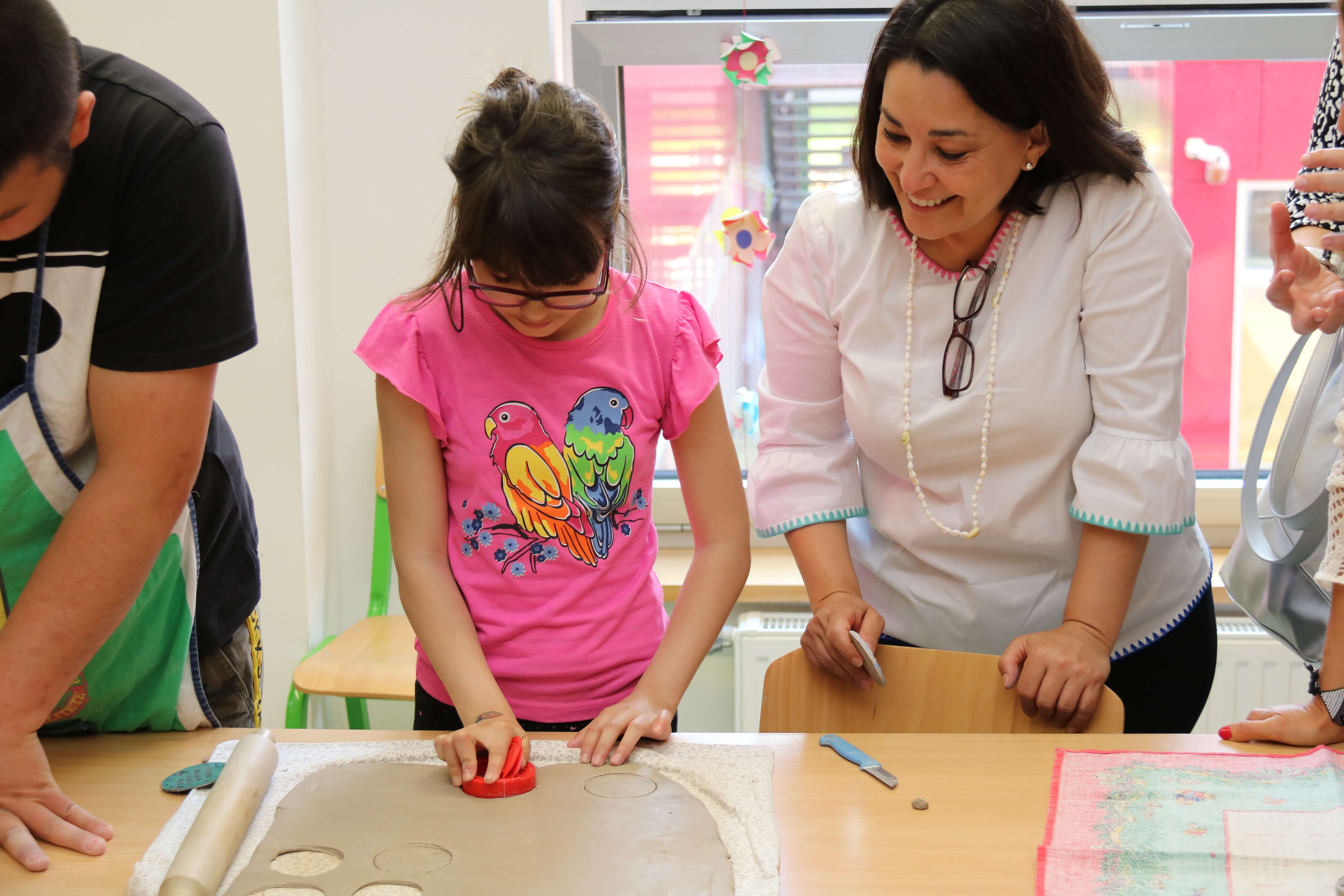
Regina M. Castillo, UNICEF office for Croatia representative with children with disabilities in Centre Tomislav Špoljar in Varaždin © Marin Ilej/UNICEF
The UN is dedicated to seeing this Convention is being respected, and United Nations International Children's Emergency Fund, commonly known as UNICEF, specializes in the issues of children's rights. Established in the aftermath of World War II, UNICEF has been at the frontlines of humanitarian crises, armed conflict, and natural disasters.
„Undeterred by the scale of the crises, we rise to the challenge, reimagine what is possible and respond by helping millions of children survive and thrive. Our on-the-ground expertise has reached more than 191 countries and territories, through committed partnerships and a passion for innovation“, says UNICEF on its official website.
Croatia signed and agreed with the Convention, and UNICEF today has its own office in Zagreb. Furthermore, it's worth noting that UNICEF has existed for 75 years, and despite firstly coming to Croatian territory while the country was part of the former Socialist Federal Republic of Yugoslavia, UNICEF has been with Croatia since the organization was established.
„Many people do not know that UNICEF helped to eradicate malaria in Croatia and that UNICEF played a key role in the development of modern dairy. Dairies were built in Zagreb, Rijeka, and Split, and factories for the production of powder milk in Osijek and Županja. Milk was distributed in schools, and for many children, it was their only meal during the day“, says Regina M. Castillo, UNICEF Office for Croatia representative.
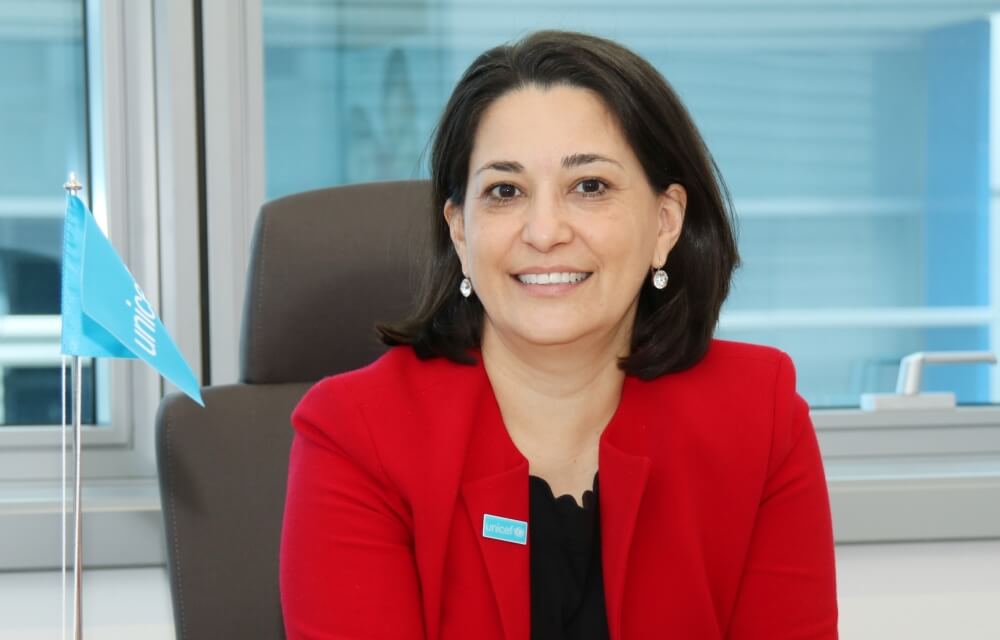
Regina M. Castillo, UNICEF office for Croatia representative © Marin Ilej/UNICEF
The UNICEF representative is elected for a five-year mandate, and Regina M. Castillo came to her function in Croatia in 2019. Her career in the UN started in 2001 and was in charge of economic and social questions in the Executive Office of the UN chief secretary Kofi Annan in New York. This was followed by Castilla moving to work in the mutual program for HIV/AIDS, known as UNAIDS. She was first the director of private sector partnerships in Geneva (2006-2012) and then moved to be the director for Bolivia, Ecuador, and Peru (2012-2015). She majored in International relations and public politics.
Born in Nicaragua, she first started her career in the 1990s as a diplomat, and she was also the headmistress for international trade in the Nicaraguan Trading Ministry.
Helping Croatia before it was cool (or an independent country)
Castillo went on to continue that after World War 2, UNICEF fed six million children every day, which included many children in Croatia.
„One of those children was our dear colleague, prof. Josip Grgurić, who is still working tirelessly for the youngest. He still remembers the yellow cheese that was part of UNICEF's humanitarian package for families, as well as the chocolate that he then tasted for the first time. He later worked at the children's hospital in Klaićeva, which UNICEF helped found, and he still works hard on UNICEF’s Child-Friendly Hospital Initiative“, says Castillo indicating how valuable but also inspiring UNICEF can be to children. Castillo added that in the Homeland War, UNICEF was the first organization on the ground, making sure that children and families received the necessary psychosocial support and humanitarian packages. After the war, they educated children on how to protect themselves from landmines.
Today Croatia developed, joined NATO and EU, and is a modern European country. With such progress, there have been many improvements in respect to children and their rights.
„Croatia has a low mortality rate of children under the age of five, extremely low stunted growth rate due to inadequate nutrition in the first years of life and the enrolment rate of children in primary school is almost 100 per cent“, pointed out Castillo.
„Croatia is an example in the world when it comes to the promotion of breastfeeding. It is rare that all public maternity wards in a country have the status of 'Child-Friendly Hospital'. With the support of UNICEF, partners have organized a network of breastfeeding support groups, and now we have more than 200 support groups in Croatia“, added Castillo on what the world can look up to this small South-Eastern European country.
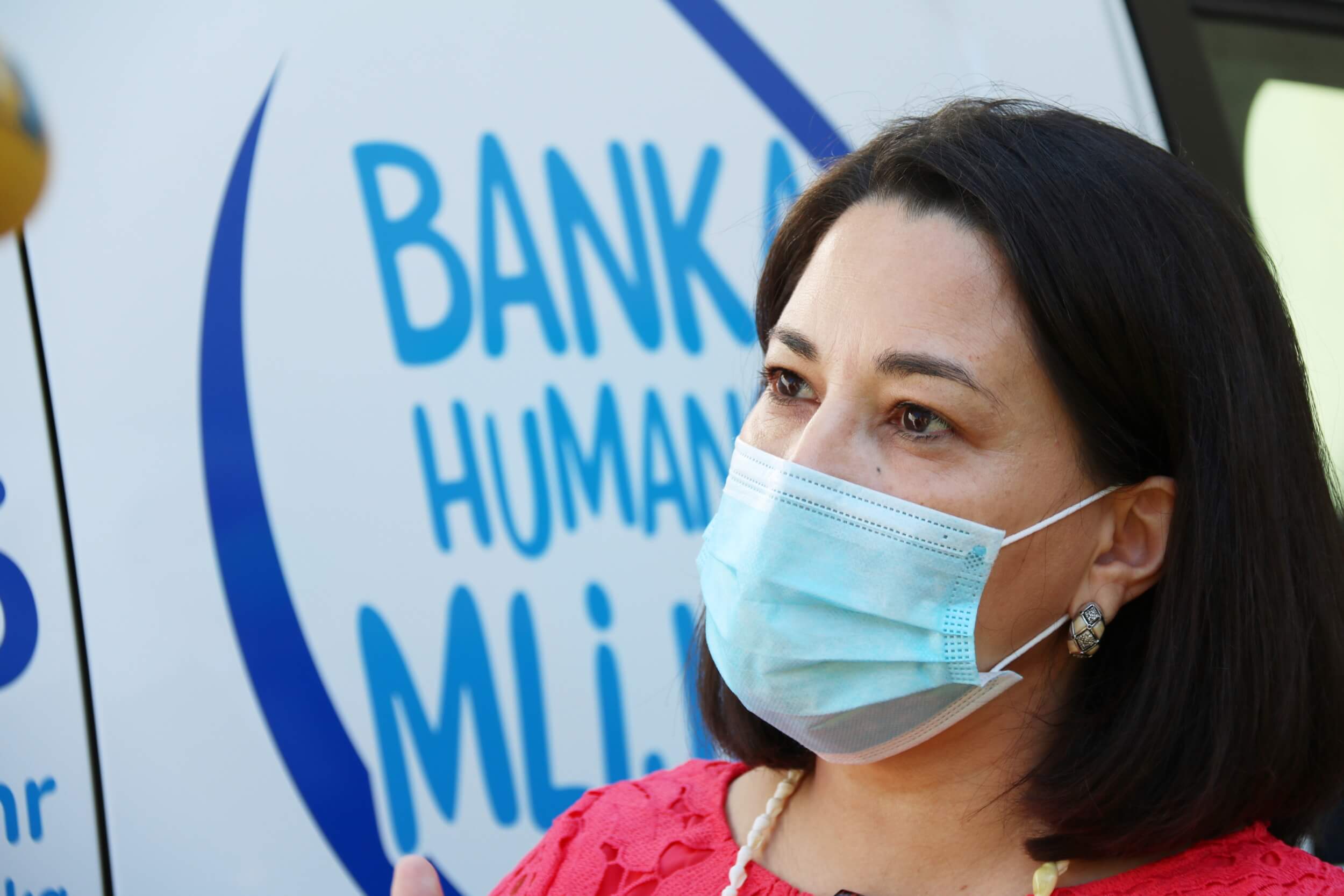
Regina M. Castillo at Human milk bank © Marin Ilej/UNICEF
Still, there are some issues Croatia needs to address and are far from ideal at the moment.
„There are still differences when it comes to access to services for children, depending on where they live and the conditions in which they grow up. Children with disabilities, as well as children from the poorest families, especially in rural areas, often do not have the opportunity to attend kindergarten and do not have the same access to specialized health services and therapies as children in urban areas. The focus of UNICEF in Croatia is on the most marginalized children: children with disabilities or developmental delays, children growing up without adequate parental care, children from minority groups, children at the risk of poverty and exclusion. UNICEF’s programs are focused on the well-being and protection of every child, with a special focus on the most vulnerable children“, pointed out Castillo.
Campaigns and programmes such as “Every child needs a family”, “The first three are the most important”, and “Stop violence among children” are perhaps the most known public action by UNICEF in Croatia, but returning to the good practices of breastfeeding, Castillo emphasizes the establishment of the Human Milk Bank in her current mandate.
„Thanks to the Human Milk Bank, prematurely born and seriously ill newborns (who do not have access to their own mother's milk) can receive milk donated by other mothers. We continually work on reducing the risk of disasters, support the development of quality foster care and provide support to parents in the upbringing and care of children through workshops and we work a lot with young people“, said Castillo.
In general, UNICEF has different types of offices in countries, and regarding the Croatian office, it’s a Country Office. In other words, most of the resources (human and financial) are invested in programs in Croatia. Castillo says that the five-year mandates have priorities that are determined in cooperation with partners. And while 80 percent of the funds raised are invested in programs for girls and boys in Croatia, there are funds and support programs for children outside of the country.
“For example, in 2018, UNICEF supported child health care in parts of Ukraine affected by the conflict and helped the building of five inclusive children's playgrounds in two refugee camps in Jordan in cooperation with the Ministry of Foreign and European Affairs in 2019. Through the ‘Schools for Africa’ program , which includes many kindergartens and schools throughout Croatia, UNICEF supports the education of girls and boys in Madagascar", Castillo listed several examples.

Regina M. Castillo, UNICEF office for Croatia representative with children on Media Literacy days press conference with Radovan Fuchs Minister of Science and Education, Krešimir Partl, State Secretary at Ministry of culture and media and Robert Tomljenović, Deputy Director of the Council for Electronic Media © Marin Ilej/UNICEF
Overall, the UNICEF Office for Croatia works closely with the Croatian Government, and most notably, with the Ministries of Social Welfare, Education, Health, and the Ministry of Foreign and European Affairs. Other partners also include experts (Croatian experts, but also building on expertise and good practice from all over the world), professional associations, academia, services providers, and NGOs.
“UNICEF’s goal is to connect all stakeholders and to advocate and support systemic change for the well-being of all children. System change is a gradual process, and it can be challenging, but when it comes to children’s rights, every step forward is well worth the effort”, explained Castillo.
Croatian citizens showing support for UNICEF
On one hand, Croatia is a good country with low mortality rates of kids and a role model for breastfeeding promotions. On the other hand, however, peer to peer violence (on whose suppression the aforementioned “Stop violence among children“ campaign works heavily on), and unequal approach to education between rural and urban areas show Croatia has both its ups and downs. Unfortunately. The downside sometimes overshadows all the positive things.
One such instance was the tragic death of a two-year-old girl from Nova Gradiška on Easter Sunday. The death of a severely injured girl, who was brought to Zagreb's children's hospital after suffering abuse and heavy beating from her biological parents (and from whom the girl was taken and given to a foster family but was then returned back to biological parents), sparked controversy and citizens outrage, culminating in changes in social welfare law, as well as sacks and investigations in the welfare center in Nova Gradiška.
„We are deeply saddened by the tragic death of two-and-a-half-year-old Nikoll on Easter Sunday. There are no words to express the pain of such a terrible event. Unfortunately, there are no simple and quick solutions to prevent violence against children. For years, UNICEF in Croatia has been continuously and persistently working in the field of child protection, educating experts from the social welfare system, but also other experts who work with children and families, such as experts from the health care, education, and justice systems. UNICEF implements various support programs for parents, and it is fully committed to the development of foster care and the improvement of the legislative framework. However, UNICEF is also aware that society as a whole, has a long way to go to achieve the goal that every girl and every boy is guaranteed the best possible care and protection. UNICEF will continue to work actively, persistently, and dedicatedly with all partners to achieve it”, commented Castillo.
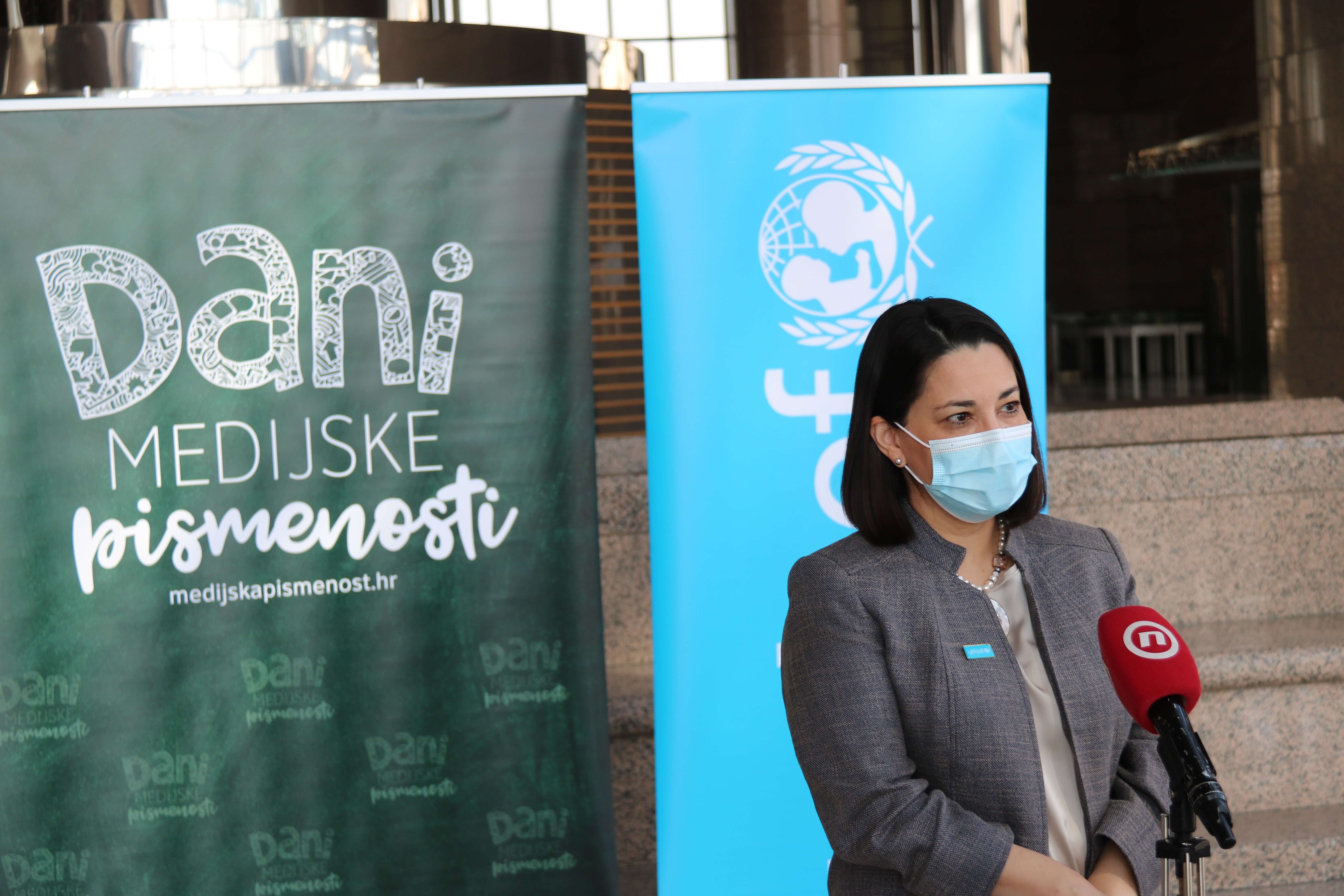
Regina M. Castillo talking on Media Literacy days press conference © Marin Ilej/UNICEF
However, Croatians recognize the importance of the UNICEF mission. Before Covid, UNICEF annually collaborated with the Museum of Illusions on the Museum of Reality exhibition which displayed the problems children faced worldwide, but which also showed what changes and solutions UNICEF brought to those areas.
“Experience tells us that citizens are ready to support the youngest, in Croatia and beyond. Implementation of our programs would not be possible without the support from citizens and companies that placed the focus of their CSR activities precisely on children. We especially value the support from our Childhood Guardians, donors who support our work with regular monthly donations and allow us to regularly conduct our programs for boys and girls, as well as react quickly with much-needed assistance in crisis situations like the earthquakes in Croatia and the COVID-19 pandemic that affected all families. UNICEF is always in the field with the most vulnerable children and their families”, notes Castillo.
In the end is important to note, that while children are recognised as a particularly vulnerable group, all human rights apply equally to children.
“All the rights enshrined in the Convention apply to every child, regardless of a child’s country of origin, gender, religion, and nationality. Every child, by birth, has all his/her rights, the right to grow up in a safe environment, to have a family, to have access to health care and education, to be able to play and develop his/her interests and reach his/her full potential”, concludes Castillo.
The five-year mandate is an agreement that sets priorities in advance, so Castillo warned that there is no opportunity for making donations outside of that framework. UNICEF office occasionally does get messages from citizens who need advice or help on issues outside of that frame, but nevertheless, UNICEF can offer them help by referring them to institutions and addresses that can offer citizens the necessary support, financial support, or information.
With expertise mentioned several times throughout this story as the insurance of delivering the best solutions to issues children face, UNICEF is always on the lookout for new people. If you want to make a change in the world while earning a fair wage yourself, check out what expertise UNICEF is looking for right now.
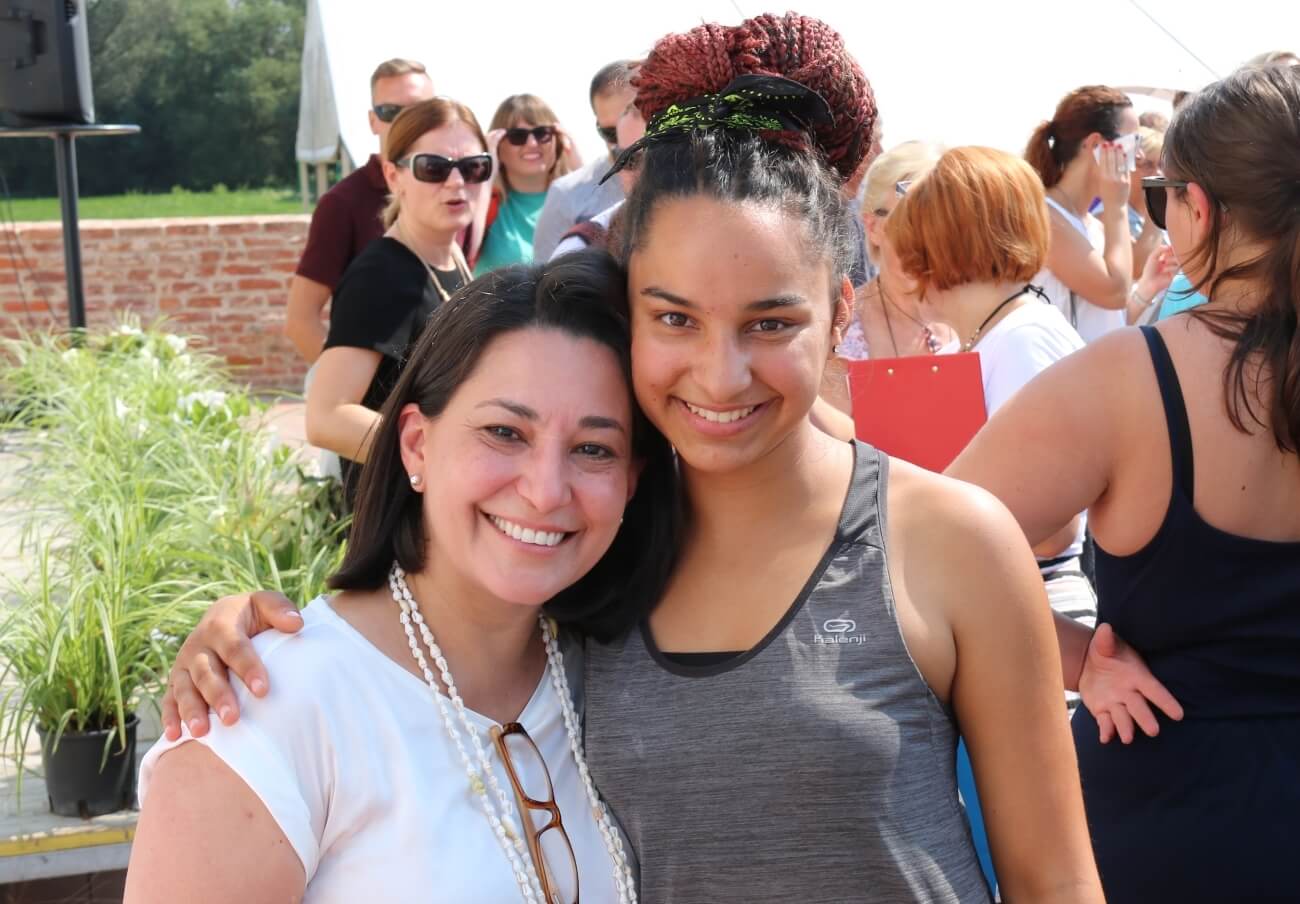
Regina M. Castillo on a foster family gathering © Marin Ilej/UNICEF
UNICEF Croatian Office is situated on Radnička cesta 41/7. To inform the public of their work, they built a considerable presence on Facebook, Twitter, Instagram, Youtube, and Linkedin. You can also find all UNICEF-related info for Croatia on their official website, and contact them via mail: This email address is being protected from spambots. You need JavaScript enabled to view it. or on phone numbers: +385 1 2442 660 and +385 1 2442 661. You can use the website to donate to a cause in Croatia too. Additionally, there are numbers: +385 1 4095 855, +385 99 2692 196, and +385 91 621 1039 for more details on donating to Croatia as well as e-mail address This email address is being protected from spambots. You need JavaScript enabled to view it.. You can also leave a donation to UNICEF in your will, and a phone number +385 1 3031 640 specializes for the issue in Croatia. If you find yourself in Croatia and you want to volunteer for UNICEF, more info can be found by sending a mail to This email address is being protected from spambots. You need JavaScript enabled to view it. and on phone number +385 1 3031 646.
And of course, you can donate for a good cause to UNICEF for any action the fund is internationally involved in.
To read more from the series "Friends of Croatia", follow TCN's dedicated page.
For more about UNICEF in Croatia, follow TCN's dedicated page.
Media Literacy Days To Be Held on April 19-25
April 18, 2021 - The Electronic Media Agency (AEM) and UNICEF Croatia will organize Media Literacy Days on April 19-25, focusing on the impact of media on the mental health of children and adolescents.
"Apart from mental health, the event will focus also on the current problem of misinformation and fake news, influencers and generally the development of critical thinking about media content as well as ways to better understand how different types of media function," the AEM said.
It noted that these topics are dealt with in new educational materials, which it will be possible to download from the web portal, where materials published in past years are also available for teachers and parents.
The project is supported, as in previous years, by the ministries of culture and media and science and education.
The purpose of the project is to raise public awareness of the importance of media literacy, empower citizens with media literacy skills, create a platform for cooperation among numerous social stakeholders, develop sustainable media literacy projects, and support teachers by developing education material for media literacy, the AEM said.
Considering the coronavirus pandemic, the event will largely be held online.
For more about news in Croatia, follow TCN's dedicated page.
UNICEF Launches Campaign to Help Child Victims of Croatian Earthquake
December the 30th, 2020 - Due to the devastating earthquakes that hit Sisak-Moslavina County, especially the areas of Petrinja, Sisak and Glina, central Croatia is currently facing an enormous humanitarian crisis, and the needs and challenges are constantly growing. As such, UNICEF has launched a campaign to aid kids suffering as a result of the latest devastating Croatian earthquake.
As Poslovni Dnevnik writes, in order to respond to the crisis, UNICEF is preparing to deliver key supplies and protective equipment to the affected areas and to provide psychosocial assistance to children and parents affected by this Croatian earthquake, as well as support to kindergartens, schools and health facilities, and social welfare institutions. This crisis has a devastating long-term effect on the lives of children who are particularly vulnerable to such instances. It is important to protect them and alleviate their difficult situation, and even long after the earthquake - they will continue to need special care.
UNICEF has launched a campaign and is calling on all Croatian residents, companies and the media to get involved and help children and families in earthquake-ravaged areas with their donations. Everyone needs support and help in order to overcome these difficult challenges together and to provide support and security to the most vulnerable children and families in the coming period.
UNICEF has already launched the procurement of emergency supplies and equipment and, in cooperation with numerous institutions, is busy assessing long-term needs, and given the growing challenges, is calling on the people of Croatia and domestic companies to donate to help children and families in Petrinja, Sisak, Glina and other areas affected by this terrible Croatian earthquake.
Donations to children and families in earthquake-ravaged areas help ensure:
Hygiene supplies and protective equipment
Psychosocial assistance for children and parents
Support to kindergartens and schools
Support to health facilities and social services.
Donations can be made on this website: https://www.unicef.hr/pomozite-djeci-pogodjenoj-potresima/ and to the UNICEF account number: HR1723600001501092524, reference number 2068-98.
For more on the Petrinja earthquake, follow today's live updates. For more on how you can help, click here.
UNICEF Donates 10 Oxygenators to Croatia
ZAGREB, July 28, 2020 - UNICEF on Tuesday donated 10 oxygenators to the Croatian Civil Protection Directorate, and these medical devices can be used by patients who need oxygen therapy.
Presenting the donation worth HRK 52,600, the UNICEF Croatia office head Regina Castillo said that the corona crisis affected each family and had a significant impact on the life of children.
Damir Trut of the Civil Protection Directorate thanked her for the donation and help which UNICEF has been providing since the outbreak of the COVID-19 pandemic.
In cooperation with the Croatian government and with the support of its partners, businesses, donors and citizens, UNICEF has provided medical and protective equipment for health workers, advice, guidelines and recommendations for families with children, and supported the online education of children and provision of social welfare services, especially for the most vulnerable families and children.


